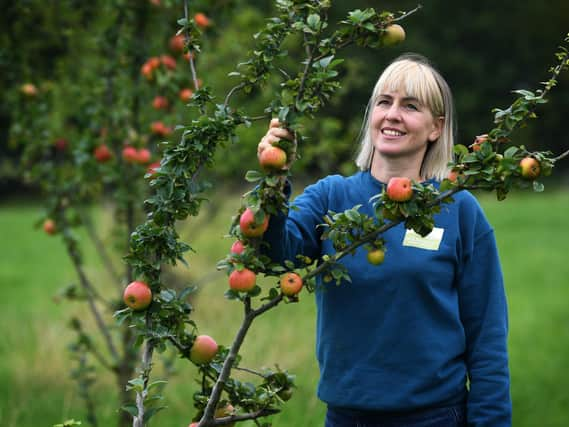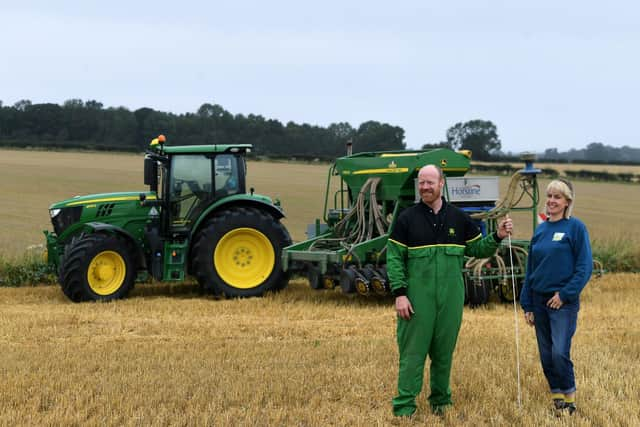The life-threatening riding accident that led to Tamara Hall transforming Molescroft Farm


This is where Tamara Hall, a former art college student who had been building a thriving business in the world of fashion designing ‘slinky dresses’, has transformed the 1,300-acre farm into a vibrant, attractive place of work, education and leisure.
Tamara began taking over the reins from her father Jonathan in 2003 following her life-threatening injuries as a result of a riding accident.
Advertisement
Hide AdAdvertisement
Hide AdNow she works closely with her sister Camilla, who manages and runs the expanding children’s day nursery on the farm, and there are offices rented by nine companies, as well as a community woodland and allotments and dog walking fields, but the farm remains the focal point.


“I couldn’t believe how positive farming was and how as an outsider my perception had been so much more negative,” said Tamara.
“Yet no-one appeared to be talking about the good things that are being done in the countryside. That’s what led us to having school visits here.
“Camilla and I had grown up with our parents in a house and smallholding on the Dalton estate, in Lockington, and although we’d had sheep and hens and had loved the outdoor life, there had never been an expectation that either of us would go into farming.
Advertisement
Hide AdAdvertisement
Hide Ad“This wasn’t really a career choice, it was something I fell into, but it has proved a lot more interesting than I ever thought.
“When I’d had my riding accident I wasn’t able to drive for six months and dad suggested I should learn about farming so that I could oversee the farm as he had always done. His business had been mainly in the fishing industry.
“I studied agronomy at Bishop Burton College. Due to my circumstances a great deal of my studying was conducted at home where I read hundreds of reports and researched farming.”
Today’s Molescroft Farm Estate is far different from when she started. Having more people around has proved a major influence.
Advertisement
Hide AdAdvertisement
Hide Ad“When I first came here we had a Portakabin that leaked as the farm office and the only person we ever saw was the odd white van driver.
“I like having so many people here. They talk about their problems and that stops you worrying so much about the weather and what that is doing to your crops.” The farm, which includes land five miles away at Walkington, runs to around 1,200 acres of arable cropping that would normally have seen a harvest of around 500 acres of winter wheat this year.
Experienced farm manager James Brown, who was with Albanwise at Routh previously, is Tamara’s right hand man.
“James is amazing. We work well together. It is our winter wheat that normally makes us the money, but this year we only had 50 acres of the variety Lili due to last year’s weather being so miserable.
Advertisement
Hide AdAdvertisement
Hide Ad“Lili does a good job for us and we also include other hard group 4 wheats. We drilled spring wheat and spring barley this year and although it then didn’t rain for months, the crops are better than expected.
“We had Belepi variety of wheat in the shed, that can be grown as winter or spring wheat, and drilled 275 acres, as well as 300 acres of spring barley. It is our second year of growing spring barley and it has gone on the contract premium.
“At one time I thought we shouldn’t have drilled in spring but I’m glad we did because it has proved much cheaper to grow and might have done better in some cases than late drilled winter wheat that has cost a lot more.”
Oilseed rape features, but Tamara is actively reducing it in the rotation. “We were growing it two years in seven, now we are at one and a half in eight. We are more flexible in our rotation and a little more open to what the conditions are like.
Advertisement
Hide AdAdvertisement
Hide Ad“Our soil includes various types of clay at Molescroft and lovely chalky Wolds land at Walkington. It is good land overall.
“We usually average around four tonnes per acre for wheat, and above on a good year. It’s too early to say what our average will be this year, but it has been challenging as it has for everyone.”
Tamara is concerned about soil quality and eliminating blackgrass, the scourge of arable farming for a number of years.
“We are moving more towards direct drilling and we are also using cover crops of either rye and phacelia or black oats and phacelia. We are conducting cover crop trials with Frontier whereby every year the same field will have the same manure, compost or residue so that we can analyse and understand what is happening to the soil.”
Advertisement
Hide AdAdvertisement
Hide AdWildlife and the environment are very much part of Tamara’s agenda and the farm is in higher level stewardship.
“When the new HLS scheme was launched, I applied straight away. We have a good deal of land that is well suited to stewardship and our yields went up as a result of taking out unproductive fields.
“I also liked the idea of letting young people know more about farming and through our stewardship we started having school visits.
“One of the first things we tried when I joined the farm was to host an open day. We arranged loads of things, but nobody came. They were the days before social media.
Advertisement
Hide AdAdvertisement
Hide Ad“People are now much more engaged with farming through Open Farm Sunday and Open Farm Schools Week.
“We started having schools on the farm in 2006. We find it works best for those in key stage 2. They are at that age when they want to understand and are keen to learn.”
The community woodland was planted in 2000, prior to Tamara’s involvement, but the 70 community allotments, run on a not-for-profit basis across five acres, have a waiting list, and the two dog walking areas are well subscribed.
The day nursery is in the process of having a new building erected such is demand.